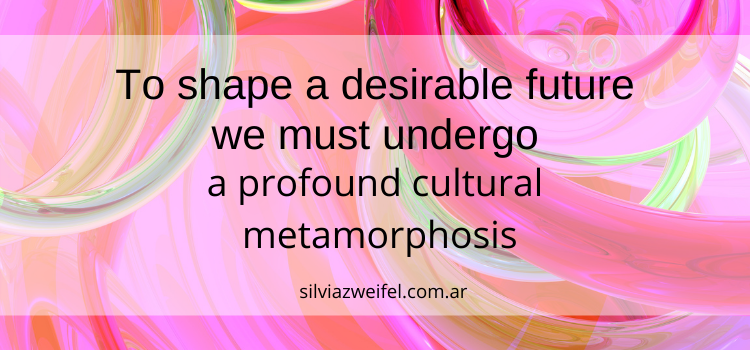
To shape a desirable future we must undergo a profound cultural metamorphosis. This paper presents a concept of an economy kind to people and to nature, Economía Amable, to accomplish this transformation. Our study depicts that a Creative Society can be developed to address the challenges of reaching the goal of a desirable future: By study-reflection-conversation-pause-education-dissemination loops that bridge science and arts, philosophy and technology a renewal of concepts and practices can be achieved.
1 Desirable futures: a key issue
How to co-create desirable futures is a key issue. We present a concept of economy within the complex thinking framework to address biosocial sustainability: desirable and achievable by means of action-research practices. It is through human activities, particularly economic (producing-distributing-consuming), that the underlying paradigms reinforce the current ecological and social challenges. They take place in the lecture hall “Society” where one learns, relearns, and recreates concepts and practices of every field of knowledge and action. Nowadays, in a scenario of increasing complexity and interdependence it is essential to reframe the underlying paradigms in order to create favorable conditions for desirable futures in the local-planetary society. How can such a challenging transformation be achieved?
2 Prospective imagination in learning contexts: towards a Creative Society
To shape a desirable future we must undergo a profound cultural metamorphosis. It can be accomplished by study-reflection-conversation-pause-education-dissemination loops that bridge science and arts, philosophy and technology to achieve a renewal of concepts and practices. Such deep transformation implies the development of a local-planetary active citizenship. Awareness of the high interdependence in the biosocial web leads to autoecoethical responsibility which is a key component of the process. As well as purposeful action to take advantage of the available knowledge, and embracing the opportunity to consciously evolve, individually and socially.
We propose learning contexts of collaborative cross-pollination for a range of diverse social actors in order to foster a Creative Society. This Creative Society highly values the integral development of its individuals, their creativity and happiness. Such a society recognizes and trains the responsibility of each individual, its active citizenship.
Economía Amable arises from the Creative Society. In contrary to the current economy where finance tends to serve finance, and real economy tends to ignore principles of life, Economía Amable is kind to people and the web of life they belong to.
Intertwining different actors and fields of action is a mean to favor the process of developing shared/ transdisciplinary knowledge. This, in turn, will be useful to refresh concepts and practices in each field of knowledge/ action.
We use a desirable future scenario depicted in an essay of Silvia Zweifel as meta-space to engage in prospective imagination & spirited conversation. Some particularities of that desirable world probably reflect participants’ current aspirations and lines of action. Under that light each one is encouraged to share his/her ideas and experiences to reflect and find out where and how s/he can contribute to favorable changes.
3 A multidimensional Economía Amable
An Economía Amable is an economy kind to people and to nature. The Spanish word “amable” derives from Latin “amabilitas” which captures the core idea of “love in action”.
Economic activities reflect the paradigms of a society. Its dynamics express the social capacity to generate value over time, genuine value for the sustenance of life and the personal-social flourishing. A Creative Society is capable of generating and cultivating economic activities that are “amable”.
Each person should be able to be in the world and to be happy. Individual-culture-biosphere are inseparable: it is in this multidiverse unity that the needs as well as the chances to satisfy those arise. Needs are satisfied by the individuals themselves or by the environment, but in the last instance always by the environment. There is a close interplay between personal-cultural trends and personal/ social circumstances in which need priorities are set from moment to moment. What prevails for each person, at each moment, shapes her/his personal life experiences and satisfaction. People who tend to develop greater awareness of themselves and their surroundings, and act accordingly, tend to experience more satisfaction: an autoecosatisfaction.
The current economy arises from a cultural system which drives the majority far away from satisfaction. Regardless of a low or high income, people seem not to be satisfied, may it be because they face difficulties to satisfy basic needs or because they constantly feel the need for something more. The prevailing economic model does not attend, nor support, the highest human aspirations. On the contrary, its dynamics not only provoke loss of sustainability, but also loss of sense and ability to recognize the intimate interrelationship of individual-society-biosphere.
However, a promising scenario is (still) possible. It requires a comprehensive individual-collective development. Enforcing collaborative efforts to drive learning spirals, a renewal of concepts and practices, and thereby enable an Economía Amable. In such an economy employment and growth, in traditional terms associated with the capital-labor interplay, are not goals anymore. Economía Amable denotes a shift in perspective:
Growth is differential, qualitative, and aimed at the social inclusion and biosocial sustainability.
Productivity moves from people to resources, and «maximizing» is considered in terms of sustainability at local biosocial systemic level.
Activities are audited, prioritized, and vitalized on the basis of their ability to generate genuine social value to meet needs in a long term horizon.
The sources of income, no matter if they come from a job, holdings of assets, derived from rights or welfare benefits, or others, are closely linked to an active local-planetary citizenship.
Benefits mainly stay in/or return to the communities where activities originate.
These characteristics belong to a system dynamics where the web of life and the highest human aspirations are at its very core: sustainability can meet happiness.
By Silvia Zweifel & Mechthild Adameit
This extended abstract is available from http://emcsr.net/book-of-abstracts/